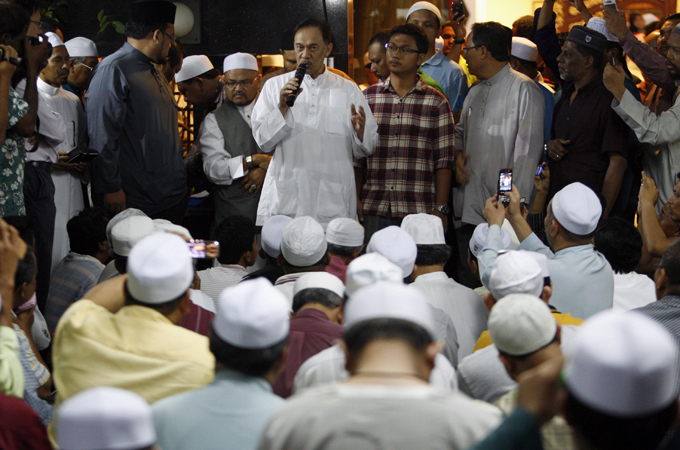Profile: Malaysia’s Anwar Ibrahim
Opposition leader faces verdict on new sodomy charges he says were concocted to send him into “political oblivion”.

 |
| Opposition leader Anwar Ibrahim speaks to his supporters after prayer at his house in Kuala Lumpur [Reuters] |
Anwar Ibrahim rose to the brink of power in Malaysia, fell spectacularly, only to rise again as a firebrand opposition leader.
A charismatic politician, Anwar was next in line to the premiership more than a decade ago but, after a falling out with then-prime minister Mahathir Mohamad, he was ousted, beaten and jailed for sodomy.
On Monday, the 64-year-old was acquitted in a surprise end to a politically-charged sodomy trial, that the popular leader called a government bid to cripple his opposition ahead of upcoming polls.
Natural politician
Anwar first rose to prominence as a radical Islamic student leader, catching the eye of Mahathir, who dominated Malaysian politics for more than two decades until he retired in 2003.
A gifted, natural politician, Anwar rose quickly in the United Malays National Organisation, which dominates the multi-racial coalition that has governed Malaysia since independence from Britain half a century ago.
He headed various ministries before taking the key finance ministry portfolio in 1991, and was lionised in the West for his reformist image.
Two years later he was all but anointed Malaysia’s future leader when he was named deputy prime minister.
But as Asian economies toppled in the 1998 regional financial crisis, a bitter rift emerged with Mahathir, who was infuriated by Anwar’s calls for reform and an end to corruption and nepotism.
Anwar was seen by many to have misplayed his hand, underestimating the proud and canny Mahathir, and was sacked then charged with corruption and sodomy.
In a drama that riveted and shocked Malaysians and earned worldwide criticism, Anwar was brought into court with a black eye after a beating from the country’s police chief.
The stunning fall from grace was widely seen both at home and abroad as politically motivated and triggered massive protests in a country where dissent is suppressed.
Anwar was jailed and finally released in 2004 when the sodomy charge was overturned. Emerging in poor health, he spent time recuperating and working as an academic.
Polarised nation
Malaysian politics was left polarised by his ouster, and by 2007 he was campaigning for Parti Keadilan Rakyat, a centrist party formally headed by his wife, Wan Azizah Wan Ismail, who had emerged as an opposition symbol while Anwar was jailed.
Wan Azizah, a petite, Irish-trained doctor, held a parliament seat in northern Malaysia during his political exile but stood aside in 2008 to make way for Anwar on the expiration of a five-year ban from public office related to his earlier conviction.
They have six children, five of them girls, and their 31-year-old daughter Nurul Izzah Anwar was elected to parliament in the landmark 2008 elections.
That year, Anwar led a three-party opposition alliance to astonishing victories in general elections, seizing control in five states and one third of parliamentary seats.
The ruling elite was shaken to the core by the results, and an ultimately failed bid by Anwar shortly afterward to seize control of parliament.
Shortly after the 2008 vote, he was hit with fresh charges for allegedly sodomising a former male aide – the charges sparked accusations they were concocted by the ruling United Malays National Organisation to stall the opposition revival.
Anwar is famed for his speech-making and ability to captivate a crowd in a country where few politicians have the common touch.
He also was viewed as the only man who could have brought together the diverse opposition parties; a conservative ethnic Malay Islamic party, a secular party largely representing ethnic Chinese and Indian minorities, and Anwar’s own multiracial party.